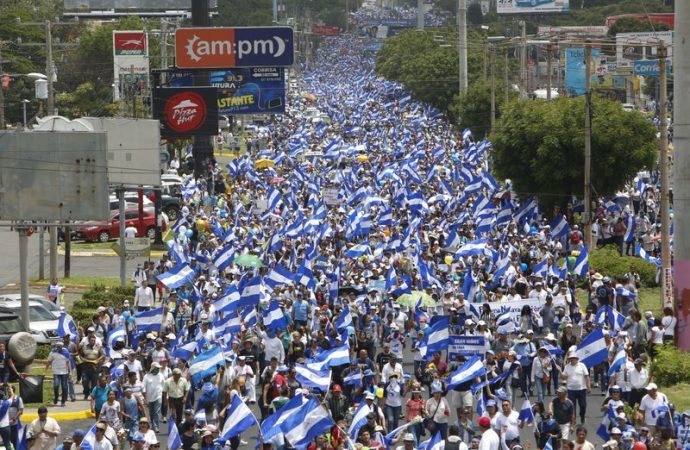Amid violent persecution including Catholic bishops getting shot at, Nicaragua’s bishops’ conference is not holding back, insisting that the “tears of the people are the tears of God” in their Advent message.
“He walks among us and in solidarity with our suffering,” the prelates said in a message released on Sunday, marking the beginning of Advent, the four weeks of preparation leading to Christmas.
“In the death or disappearance of any human being, in their detention, in unfair imprisonment, in the forced exile of families, in the manipulation of conscience especially through some media outlets and social media that many times are promoters of fake news and division among the people, God himself has been denied,” they said.
The message was signed by all ten Nicaraguan bishops despite attempts from the government of President Daniel Ortega and his wife, Vice President Rosario Murillo, over the last several months to sow division within the Church.
Murillo, who many believe is the one actually calling the shots, has recently been sanctioned by the United States for corruption and serious human rights abuses. She’s believed to have held influence over a youth paramilitary force that the U.S. says has engaged in extra-judicial killings, torture and kidnapping.
What began in April as a peaceful civil uprising in protest of a social security reform has now devolved in what many locals described to Crux during a Nov. 16-28 visit to Nicaragua as a “witch hunt,” with hundreds of protesters being imprisoned, accused of terrorism, and many more “disappearing,” never to be seen again.
In addition, thousands have fled the country, including the entire family of Bishop Silvio Jose Baez, auxiliary of Managua, who lives in the diocesan seminary, with a limited range of movement as he’s under constant surveillance.
In October, the government launched a statement addressed to Pope Francis accusing Baez of terrorism, and now security forces are forcing public employees to sign it at the risk of losing their jobs if they refuse. It calls for the pontiff to take the bishop out of the country.
Under the circumstances, the bishops write, it’s valid to wonder if a new horizon for a better Nicaragua is “possible.”
“In this environment, the Church of Christ remains and waits in its Lord,” they wrote. “The optics of faith is what allows us to wait against every hope. God has the last word over life and the history of the peoples and, as such, over our own nation.”
Despite the uphill climb, according to the bishops, there are signs of hope, including the fact that the current crisis has “exposed the reality of our nation.”
They also see a “new horizon” based on the concern people have shown for the human person, with gestures of “solidarity, love and forgiveness,” key to surmounting “circles of death.”
“We Christians have to redouble our life of prayer and testimony in the face of fear and the pessimism that tries to impose, first in the hearts and then in the strata of human life including, our Christian communities,” they said.
Civic protest is currently banned in Nicaragua, and one could go to prison simply for carrying the national flag or inflating balloons with the national colors, blue and white.
They insist that dialogue is the only way out. There was an attempt at a diplomatic solution to the crisis, which began in May but was suspended. The bishops were both mediators and witnesses of the dialogue between the government and several other parties.
The bishops also write that no one can remain indifferent to the suffering of others, even if they’re “adversaries.”
According to the bishops, “amidst so much injustice,” the gaze of the Nicaraguan people must remain on Jesus Christ.
“The search for pacific solutions must come from an authentic conversion to Him,” they wrote. “This is a decisive time for those of us who profess the Christian faith.”
The prelates quote Pope Pius XII, who said that “nothing is lost with peace; everything can be lost with war.”
Peace, they argued, is a gift from God the people of Nicaragua must ask for “insistently and on our knees.”
“Nicaraguans have already suffered in our own flesh the ravages of a fratricidal struggle,” they wrote, referring to a bloody civil war in the 1980s. “This did not make us more human. On the contrary, it opened wounds that have not yet been healed and that still ooze hatred and violence.”
For this reason, they urge people not to be tempted by easy solutions, but to act with civility because a new Nicaragua needs non-violent leaders who, at “the hands of God, reach the goals of freedom and justice.”
Non-violence, they argued, breaks the violent logic that the world is in, where weapons are worth more than human life.
The ongoing crisis, the bishops argue, has “deep roots” in structural and social sin. The world today needs the witness of “unarmed” prophets, who understand that dialogue must be oriented at opening new perspectives.
“This requires courage, audacity, respect for the other and, above all, much love for the nation,” they wrote. “In this sense, a good politician is one who, having in mind the interests of all, dialogues with an open spirit. A good politician always opts for generating processes more than occupying spaces.”

